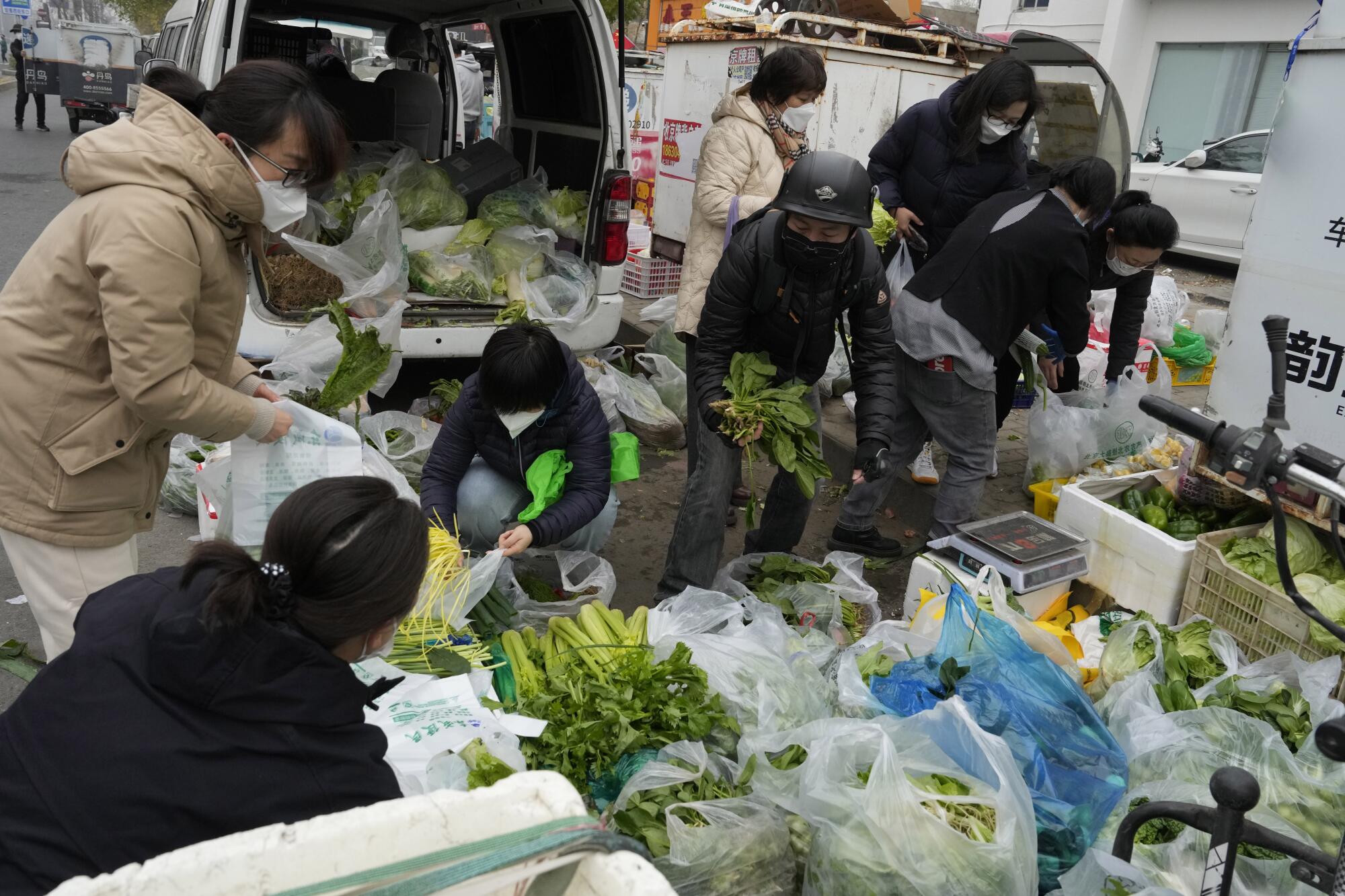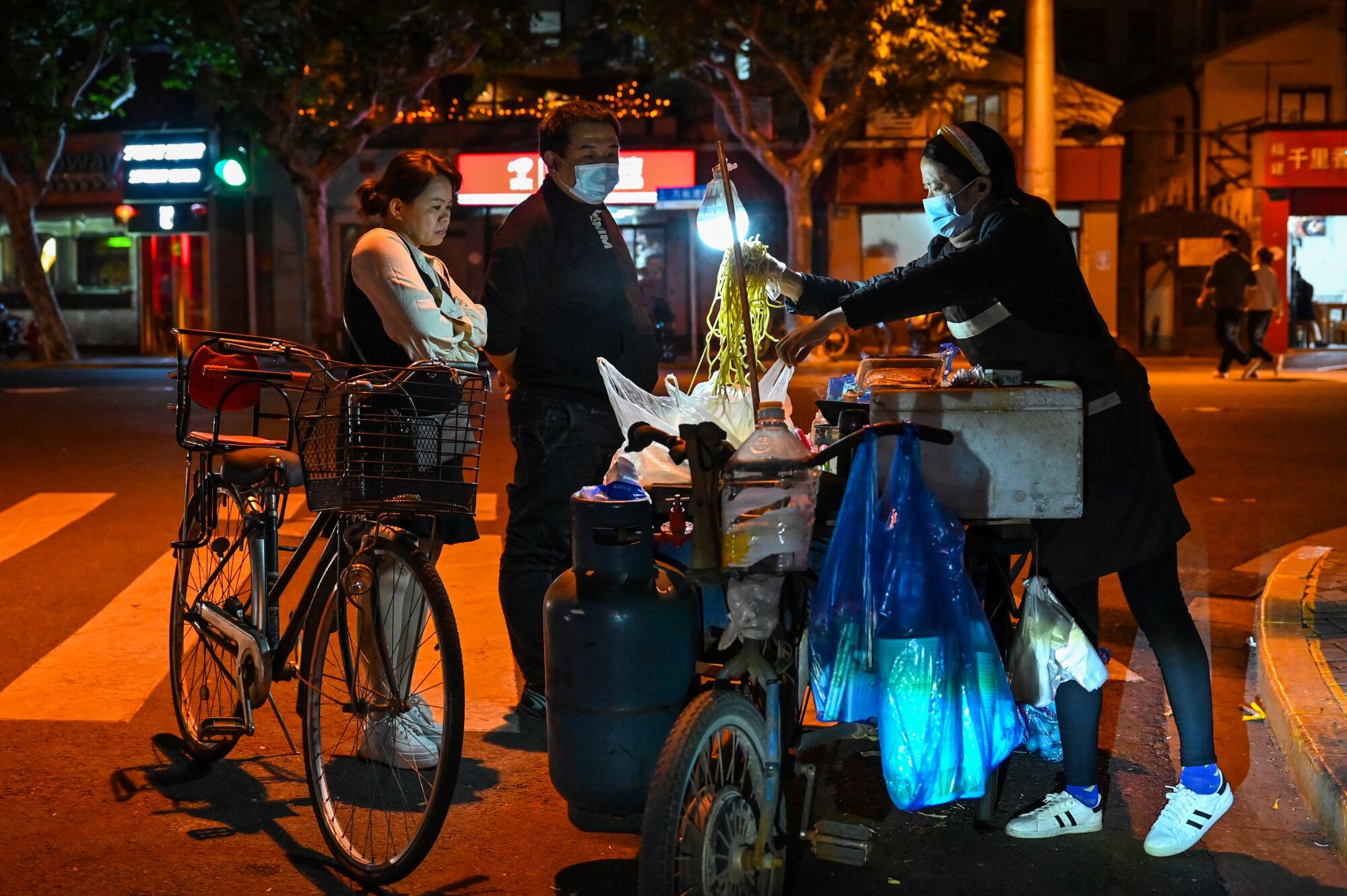
- Share via
As a child, Li Lejie went to work with his parents, acting as a lookout as they sold steamed buns on the street.
His job was to shout a warning if he spotted the chengguan, or urban management officers, who could fine them or confiscate their supplies for hawking food by the side of the road. His mother often told him he had to attend college someday, so he could become a businessman like his uncle.
Last summer, Li graduated from a university in Chengdu, in western China, with an internship in online tutoring and an opportunity for a promotion. But to his parents’ dismay, he quit to start his own street stall instead.
“I just wanted to try it, see what it was like,” the 23-year-old said. “And I had some quibbles with work.”
After 10 months of interning, Li was fed up with his supervisor and frustrated that his promotion would be probationary, without a raise for several weeks. Underwhelmed by other job openings in Chengdu, he moved to Guangzhou, on the southern coast, in August to join a high school friend selling braised snacks to passersby.
Manufacturing is leaving China for cheaper countries. To survive, Chinese factories are trying to create their own global brands to sell their goods.
As China’s economic growth falters and young workers vie for dwindling jobs, many are embracing a humble occupation they might have once considered beneath them: street vending. Local governments that once treated it as a public nuisance have encouraged the trend, relaxing regulations in the hopes that more markets and food kiosks will boost spending and employment.
The paradigm shift is a sign of the deep wounds that the pandemic, along with tight government controls, have left on the world’s second-largest economy.

In June 2020, then-Premier Li Keqiang advocated for the “street stall economy” as a way to offset the financial pain caused by the country’s harsh COVID-19 restrictions. At that time, the idea of turning to food stalls to jump-start growth was widely panned and soon abandoned. But after three years of China’s unyielding “zero-COVID” pandemic policy, which stymied travel, spending and industrial output, authorities are turning to every possible option to bolster economic activity.
“We all thought that with the end of zero-COVID, we would get an explosion in consumption,” said Michael Pettis, professor of finance at Peking University’s Guanghua School of Management. “We’re still waiting for that to happen.”
While consumer spending picked up after coronavirus prevention measures were repealed in late December, the rebound has since tapered because of declining confidence in the country’s financial health amid a housing downturn, a slack labor market and high levels of government and household debt.
In May, youth unemployment reached a high of 20.8%, ahead of a record 11.6 million more college graduates entering the workforce this summer. A regulatory crackdown on private enterprise has hurt sectors that traditionally hired graduates, such as technology, education and real estate.
First tariffs, then COVID, now worries of war. Multinational companies have more reasons than ever to get out of China — if they can.
The dire situation has forced the government to swallow its traditional disdain for street stalls, long considered a plague on cleanliness and order in Chinese cities. Earlier this year, Beijing and Shanghai loosened rules to allow pop-up sellers to operate in more public areas. Other major cities, including Hangzhou and Shenzhen, have followed suit.
In Guangzhou, the capital of Guangdong province, street food is also back on the menu, though the chengguan tasked with supervising vendors still keep a zealous eye out for rule-breakers. Even so, Li spends much less time running from them than he did as a boy.
“If they come, they just stay to the side, maybe take a picture and wait a while,” Li said. “Now they’re all softer than before. It is a big change.”

As prospects for career advancement have dimmed for young Chinese, some workers have begun to reevaluate how much they will sacrifice for ambition, trading in high-powered jobs for a better work-life balance, flexible hours and travel. The growing inclination to try out street vending has also been driven in part by social media, a source of new recipes as well as videos on how to get started.
When Hu Jia, a 23-year-old in Chengdu, began posting video diaries of her new food cart on China’s Instagram-like app Xiaohongshu, other users started messaging her for advice on how to resign from their jobs and run their own stalls.
“They probably feel that the work they put in is not proportional to what they get back,” Hu said. “They could get pressure from their boss, their salary is low, they’re exhausted, so they think that going to work for themselves, whatever else it is, is at least freeing.”
Hu had been dissatisfied with her monthly salary of 5,000 yuan, or about $700, working in e-commerce with little opportunity to advance at the company. When her boyfriend made her a tasty mashed potato dish that he’d seen online, Hu thought it might be worth trying to sell.
Secretary of State Antony J. Blinken has met with Chinese President Xi Jinping and says they agreed to stabilize deteriorating U.S.-China relations.
Within three days, they had recouped their initial investment of 900 yuan, or about $125, she said. The couple has also started teaching others how to launch their own street-side businesses, for a fee.
“A street stall is a relatively low-cost thing to start up,” Hu said. “Plus, we aren’t working right now. If we had failed, we still would have been fine.”
Part of the unemployment crisis is due to a mismatch in available jobs and the high expectations of educated workers. The shortage of desirable positions for today’s college graduates, who came of age during China’s boom times, has sparked discussion over the younger generation’s willingness to accept other types of work. In a flippant twist on street vending, some graduates have set up stands to sell their academic knowledge, such as political science or psychology consulting.
Online, many have compared themselves to Kong Yiji, a figure from Chinese literature who wears a scholar’s robes but lives in poverty because he refuses to take a position beneath his education level. “Higher education is not just a stepping stone, but a pedestal I can’t come down from, more so is the long gown that Kong Yiji can’t take off,” one viral social media post declared earlier this year.

In response, Chinese state media have encouraged young people not to hold on to such “shackles of the heart” and have frequently warned against tangping, or “lying flat,” a popular term for giving up in the face of burnout and “involution,” or diminishing economic returns.
Zhang Miao, a 28-year-old in Suzhou, west of Shanghai, decided to “take off his long gown” a year ago, when he shuttered his e-commerce business as online shopping slowed and started selling skewers of barbecued meat instead. His family had a hard time accepting his decision.
“They think what I’m doing is not as good as the industry I was in before,” he said. “They worry that my income has decreased, and the older generation, my grandparents, probably think that it’s shameful.”
As his kiosk has become more profitable, Zhang said, his parents have grown more supportive. He’s since overcome his initial fear of embarrassment about selling food on the street, but still considers it too undignified to cry out his wares.
“Although Kong Yiji’s long gown has come off, the undergarments are still there,” he said.
News Alerts
Get breaking news, investigations, analysis and more signature journalism from the Los Angeles Times in your inbox.
You may occasionally receive promotional content from the Los Angeles Times.
As some local street markets have flourished, Chinese media have been quick to tout success stories.
In May, the little-known industrial city of Zibo in Shandong province became an unexpected sensation on Douyin, or Chinese TikTok, drawing millions of visitors to its lively barbecue stalls. Government workers from other parts of China toured Zibo to glean inspiration, and the city’s mayor spoke at a May forum where new Chinese Premier Li Qiang emphasized the need to create more consumer hot spots.
But even with more young people on board, street vending is unlikely to be a panacea for China’s economic troubles.
“It’s just a short-term, temporary solution to the unemployment challenge,” said Zhang Yifan, a professor of economics at the Chinese University of Hong Kong. “For long-term growth, China still needs to rely on something else.”

Government officials have adopted various measures to improve employment rates, including mandates for state-owned companies to increase headcount. Guangdong province announced a proposal to place 300,000 graduates in jobs in rural villages, while Henan province unveiled a 100-day plan to provide unemployed graduates with guidance and training.
Economists say that without significantly increasing people’s income, it will be difficult to boost consumption enough to wean China off the infrastructure investments the government has relied on to keep the economy growing. In June, the central bank unexpectedly cut interest rates in an effort to stimulate borrowing and increase spending.
And as street stalls have become more popular, it’s already getting harder to make money.
“I thought by opening a stall I could escape the involution of looking for work,” one vendor wrote on Xiaohongshu. “It turns out I just took up another kind of involution.”
The southwestern Chinese city of Dali has become a haven for digital nomads and others seeking a carefree lifestyle.
According to young merchants, space rental fees have increased, while every day more stalls pop up offering cheaper prices. Many describe the work as tiring, and recommend against quitting a well-paid job or taking up street vending as a full-time occupation.
“The competition is huge,” said Wu Yuanyuan, 23, a pharmaceuticals trainee who started selling desserts out of her car trunk on weekends to make extra cash. “One day you set up a stall; the next day there’s probably two or three more vendors in that same spot.”
Li, the Guangzhou vendor, said it took months to fine-tune his product and determine the location with the best foot traffic. He and his high school classmate tried selling braised duck wings first, but the preparation took hours and the profit margins were thin.
Braised bullfrogs were another experiment, but they needed to be bought fresh, which meant Li and his friend had to eat the unsold ones themselves — he estimated they each ate as many as four a day.
They finally settled on grilled fish, paying another street vendor 6,000 yuan, or about $840, to teach them how to make it. After five days of test-cooking 30 fish, with the help of a chef friend to adjust the recipe, they started selling in October.
“Everyone says opening a street stall is liberating — since you’re working for yourself, you can rest when you want to,” Li said. “But when you do it, you realize once it starts going well, you can’t bear to stop and rest.”
Times staff writer Yang and special correspondent Shen reported from Taipei, Taiwan.
More to Read
Sign up for Essential California
The most important California stories and recommendations in your inbox every morning.
You may occasionally receive promotional content from the Los Angeles Times.


















